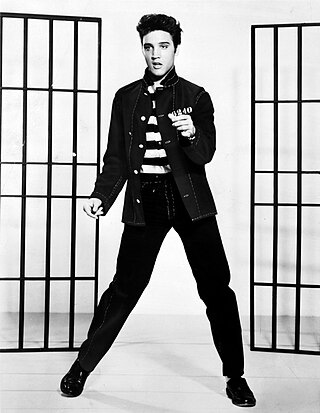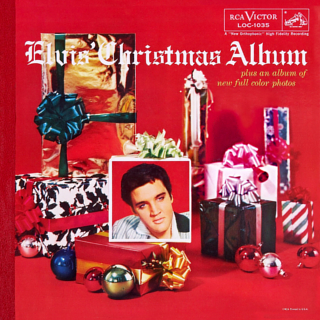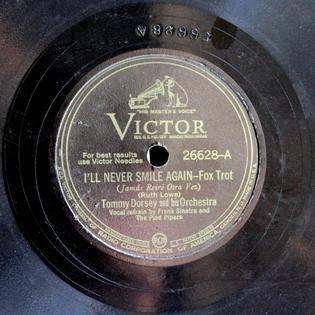Related Research Articles

Elvis Aaron Presley, also known mononymously as Elvis, was an American singer and actor. Known as the "King of Rock and Roll", he is regarded as one of the most significant cultural figures of the 20th century. Presley's energized interpretations of songs and sexually provocative performance style, combined with a singularly potent mix of influences across color lines during a transformative era in race relations, brought both great success and initial controversy.

Thomas Andrew Dorsey was an American musician, composer, and Christian evangelist influential in the development of early blues and 20th-century gospel music. He penned 3,000 songs, a third of them gospel, including "Take My Hand, Precious Lord" and "Peace in the Valley". Recordings of these sold millions of copies in both gospel and secular markets in the 20th century.

"Whole Lotta Shakin' Goin' On" is a song written by Dave "Curlee" Williams and sometimes also credited to James Faye "Roy" Hall. The song was first recorded by Big Maybelle, though the best-known version is the 1957 rock and roll/rockabilly version by Jerry Lee Lewis.

The Jordanaires were an American vocal quartet that formed as a gospel group in 1948. Over the years, they recorded both sacred and secular music for recording companies such as Capitol Records, RCA Victor, Columbia Records, Decca Records, Vocalion Records, Stop Records, and many other smaller independent labels.

Clyde Julian "Red" Foley was an American musician who made a major contribution to the growth of country music after World War II.

The Blackwood Brothers are an American southern gospel quartet. Pioneers of the Christian music industry, they are 8-time Grammy Award winners in addition to winning 7 Gospel Music Association Dove Awards. They are also members of the Memphis Music Hall of Fame, Gospel Music Hall of Fame, the Southern Gospel Museum and Hall of Fame.

John Daniel Sumner was an American gospel singer, songwriter, and music promoter noted for his bass voice, and his innovation in the Christian and Gospel music fields. Sumner sang in five quartets and was a member of the Blackwood Brothers during their 1950s heyday. Aside from his incredibly low bass voice, Sumner's business acumen helped promote Southern Gospel and move it into the mainstream of American culture and music during the 1950s and 1960s.

"Million Dollar Quartet" is a recording of an impromptu jam session involving Elvis Presley, Jerry Lee Lewis, Carl Perkins, and Johnny Cash made on December 4, 1956, at the Sun Record Studios in Memphis, Tennessee. An article about the session was published in the Memphis Press-Scimitar under the title "Million Dollar Quartet". The recording was first released in Europe in 1981 as The Million Dollar Quartet with 17 tracks. A few years later more tracks were discovered and released as The Complete Million Dollar Session. In 1990, the recordings were released in the United States as Elvis Presley: The Million Dollar Quartet. This session is considered a seminal moment in rock and roll.
"Take My Hand, Precious Lord" is a gospel song. The lyrics were written by Thomas A. Dorsey, who also adapted the melody.

Elvis' Christmas Album is the third studio album and first Christmas album by American singer and musician Elvis Presley on RCA Victor, LOC -1035, a deluxe limited edition, released October 15, 1957, and recorded at Radio Recorders in Hollywood. It has been reissued in numerous different formats since its first release. It spent four weeks at No. 1 on the Billboard Top Pop Albums chart, and was the first of two Christmas-themed albums Presley would record, the other being Elvis Sings the Wonderful World of Christmas, released in 1971. The publication Music Vendor listed Elvis' Christmas Album on their singles charts for two weeks in December 1957 – January 1958, with a peak position of No. 49.
"Pennies from Heaven" is a 1936 American popular song with music by Arthur Johnston and lyrics by Johnny Burke. It was introduced by Bing Crosby with Georgie Stoll and his Orchestra in the 1936 film of the same name.

"I'll Never Smile Again" is a 1939 song written by Ruth Lowe. It has been recorded by many other artists since, becoming a standard.

His Hand in Mine is the fifth studio album by American singer and musician Elvis Presley, released on November 23, 1960 by RCA Victor in mono and stereo, catalog number LPM/LSP 2328. It was the first of three gospel albums that Presley would issue during his lifetime. Recording sessions took place on October 30 and 31, 1960, at RCA Studio B in Nashville, Tennessee. It peaked at #13 on the Top Pop Albums chart. It was certified Gold on April 9, 1969 and Platinum on March 27, 1992 by the Recording Industry Association of America.
Traditional black gospel is music that is written to express either personal or a communal belief regarding African American Christian life, as well as to give a Christian alternative to mainstream secular music. It is a form of Christian music and a subgenre of black gospel music.
"Move On Up a Little Higher" is a gospel song written by W. Herbert Brewster, first recorded by Brother John Sellers in late 1946, but most famously recorded on September 12, 1947, by gospel singer Mahalia Jackson, a version that sold eight million copies and is the best-selling gospel song of all time. The song was honored with the Grammy Hall of Fame Award in (1998). In 2005, the Library of Congress honored the song by adding it to the National Recording Registry. It was also included in the list of Songs of the Century, by the Recording Industry of America and the National Endowment for the Arts, and is in the Rock and Roll Hall of Fame as one of the 500 songs that shaped rock.

"Let's Have a Party" is a 1957 song written by Jessie Mae Robinson and recorded by Elvis Presley for the movie Loving You. It was released as a single in the United Kingdom under the title "Party" and peaked at #2 in the UK Singles Chart. Wanda Jackson recorded the song for her first album, Wanda Jackson, released in 1958. The song was released as a single by Jackson in 1960 and entered the UK chart on 1 September of that year, spending eight weeks there and reaching #32; it also reached #37 on the Billboard Hot 100 in 1960. The Jackson version was later featured in the 1989 film Dead Poets Society. Her recording of the song was inducted into the Grammy Hall of Fame in 2024.
This is an incomplete list of historical markers in Villa Rica, a town in the U.S. state of Georgia. This list shows a mix of Georgia state, Georgia Historical Society and private markers, and is missing a number of Villa Rica Historic Preservation Commission historic markers.

Peace in the Valley is an EP by American singer and musician Elvis Presley, released in April 1957 on RCA Victor Records in mono with catalogue number EPA 4054. It reached number three on the short-lived Billboard EP chart, number three on the album chart and number 39 on the singles chart.

Million Dollar Quartet is a jukebox musical with a book by Colin Escott and Floyd Mutrux. It dramatizes the Million Dollar Quartet recording session of December 4, 1956, among early rock and roll/country stars who recorded at Sun Studio in Memphis, which are Elvis Presley, Johnny Cash and Carl Perkins, and newcomer Jerry Lee Lewis. The musical opened on Broadway in 2010, after several tryouts and regional productions, and spawned a 2011 West End production.
Peace in the Valley is a 1939 song written by Thomas A. Dorsey, originally for Mahalia Jackson.
References
- 1 2 "There'll be peace in the valley for me, 1939". USC Libraries . Retrieved July 17, 2021.
- ↑ Library of Congress. Copyright Office. (1939). Catalog of Copyright Entries 1939 Musical Compositions New Series Vol 34 Pt 3 For the Year 1939. United States Copyright Office. U.S. Govt. Print. Off.
- 1 2 Terry, Lindsay (May 1, 2015). "Story behind the song: 'Peace in the Valley'". The St. Augustine Record. Retrieved May 10, 2024.
- ↑ Snoddy, Glen (1972). "Nashville, The Recording Center" (PDF). Country Music Who's Who. Record World. Retrieved May 10, 2024.
- ↑ Whitburn, Joel (2004). The Billboard Book Of Top 40 Country Hits: 1944-2006, Second edition. Record Research. p. 124.
- ↑ "About This Program - National Recording Preservation Board - Programs at the Library of Congress - Library of Congress". Loc.gov. Retrieved October 3, 2018.
- 1 2 Young, Trina (December 14, 2016). "When Elvis Presley Dared To Sing Gospel on The Ed Sullivan Show". elvisbiography.net. Retrieved May 10, 2024.
- ↑ "Elvis Presley's Final Ed Sullivan Show Performance". edsullivan.com. January 5, 2012. Retrieved May 10, 2024.
- ↑ "Gospel Music Hall Of Fame: Thomas A. Dorsey - Inducted 1982". Gospel Music Hall of Fame. 1982. Retrieved May 10, 2024.
- ↑ Archives, 2001-period Grammy Nominees, National Academy of Recording Arts & Sciences, Grammy.com
- ↑ Zielinski, Peter James. "Photo Coverage: MILLION DOLLAR QUARTET Opens on Broadway". BroadwayWorld.com.
- ↑ MDQ Merchandising LLC (2010). “Song List” and “Performing Credits”. In Million Dollar Quartet (p. 5) [CD booklet]. New York City: Avatar Studios; and Chicago: Chicago Recording Company.